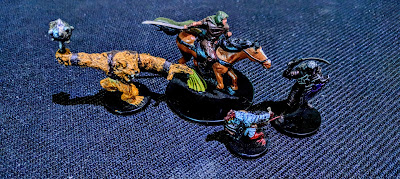Lime Lighting
There’s a delicate balance when it comes to the tabletop in terms of personality, character interaction and ensuring everyone has a good time. Although the DM is often looked towards to ensure everyone’s character gets a chance in the lime light, I believe the responsibility also lies at the feet of each person at the table, especially people who find themselves leading the rest of the party.
Within a group there
will often be dominate personalities and some more submissive ones. People with
dominate personalities often are quick to step up to social interaction encounters
and also don’t mind throwing their weight around in all other aspects of the
game. This provides them with an unbalanced majority of “air time” leaving
others feeling disenfranchised or ignored. Some players are fine to sit back and just enjoy
the experience regardless, yet others can become frustrated and will sometimes
leave the group or game.
In a few of my recent games there has been one such person
in each group. They often take up the majority of interactions which can cover
roughly 50 – 60% of total game time. This often gives the other players little
chance to impact the narrative or the choices being made and can also lead characters
away from their chosen goals or sometimes, alignments.
Obviously the DM can stop this by asking other players to
interact in-character but I think this needs to and should be tackled by the
person who has become the unofficial party leader. If I find myself in this
position of being the most outspoken, or in a group where most choose to sit
back during social interactions, I often attempt to rope them into the
conversation. This can be done mid speech by asking their opinion or gaining
their insights in a particular field.
For example if I were talking to a local noble, I may say
something like “That’s when we found the kobold tunnel, actually Gundar here
can help explain the how that happened.” Or perhaps “Well the tunnel went for a number
of miles, Lorro, what was the bearing the tunnel eventually led towards?” Finally, “Well Abby, I don’t
know if I’d prefer either of these quests, which would you prefer to keep us
employed? Gunday, Lorro, where should we head next?”.
Questions and interactions such as these can make your
table-mates know that you value their input and rely on them to help advance
the narrative and also keep them engaged throughout social interactions. It also allows interactions to happen in-character without any need to meta-game.
I think ultimately as a player, you have as much of a responsibility to ensure everyone is enjoying themselves as much as the DM does. Stepping up to share the lime light with your companions leads to a better game, after all, if you want to play D&D as a single player game, go buy Skyrim.


Comments
Post a Comment